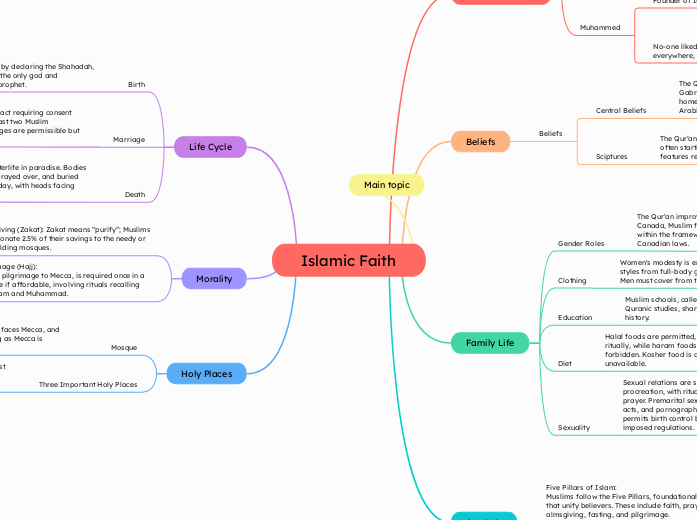da louis lam manca 1 anno
155
Islamic Faith

da louis lam manca 1 anno
155

Più simili a questo
Medina: Prophet's Mosque contains his tomb and is the site of the very first mosque.
Jerusalem: Dome of the Rock built on the place Muhammed ascended to heaven as a shrine for pilgrims.
Mihrab: The mihrab is an ornate alcove in the Qiblah wall where the Imam stands to deliver prayers.
Fatwas: Fatwas are religious edicts issued by scholars on various matters, from legal issues to everyday concerns, based on Islamic jurisprudence.
Fiqh: Fiqh, interpretations by legal experts, adapts Shariah to new situations not covered by the Qur’an, Sunna, or Hadith.
Divorce: Divorce is allowed if all options are exhausted, involving marital arbitration, counseling, and a waiting period to confirm no pregnancy.
Birth Rituals: Babies are considered born Muslim, washed, and the Adhan (call to prayer) is whispered in their ear. A naming ceremony occurs a week later.
Star and Crescent: This symbol represents Islam, appearing on flags of many Muslim-majority countries, associated with the historical expansion of Islamic power.
Colors: Islamic symbolism includes: White: Purity and peace. Black: Mourning and devotion. Green: Sacred, used in mosque decorations, Qur'an bindings, and flags. Red Crescent: Muslim equivalent of the Red Cross.
Calligraphy: Arabic calligraphy, especially the word "Allah," is a significant Islamic symbol, often seen in art and religious texts.
The Qur’an has 114 Suras with names and verses, often starting with “In the name of Allah,” and features repetitive, dramatic themes.
God's Revealed Books: The Qur'an, revealed by God, provides Muslims with guidance on living their lives.
Structure of the Qur'an: The Qur'an has 114 Suras, named chapters with verses, often starting with “In the name of Allah,” featuring repetitive, dramatic themes.
The Qur’an, revealed to Muhammad by Angel Gabriel, guides worship and behavior. In Muslim homes, it's kept clean and high. Children learn Arabic to read it; memorizers are called hafiz.
Seven Basic Beliefs: Muslims believe in one Allah, His Angels, revealed Books, Messengers, the Last Judgment, predestination, and life after death.
Muslims believe in Tawhid, the oneness and unity of God, rejecting anything distracting from this union.
Angels interact with humans, delivering divine messages. Each Muslim has two guardian angels recording their actions.
In 622 CE, the people of Medina offered Muhammad protection from persecution and he led the people of Islam there. This migration became known as the hijrah.
Islam split into Sunni and Shi'ite over disagreement on Muhammad's successor: Sunnis prioritize capability, while Shi'ites emphasize bloodline; 90% of Muslims are Sunni, 10% are Shi'ite.
Muhammad was troubled by the inequalities of Meccan when he was traveling around as a trader
He believed in Allah
Islamic religion includes Africans from Nigeria, Arabs from Iraq, southern Asians from Pakistan and Indonesia, and other ethnic and cultural groups.
Canadian Muslims come from India and Pakistan, Arab and Middle Eastern countries, and others.